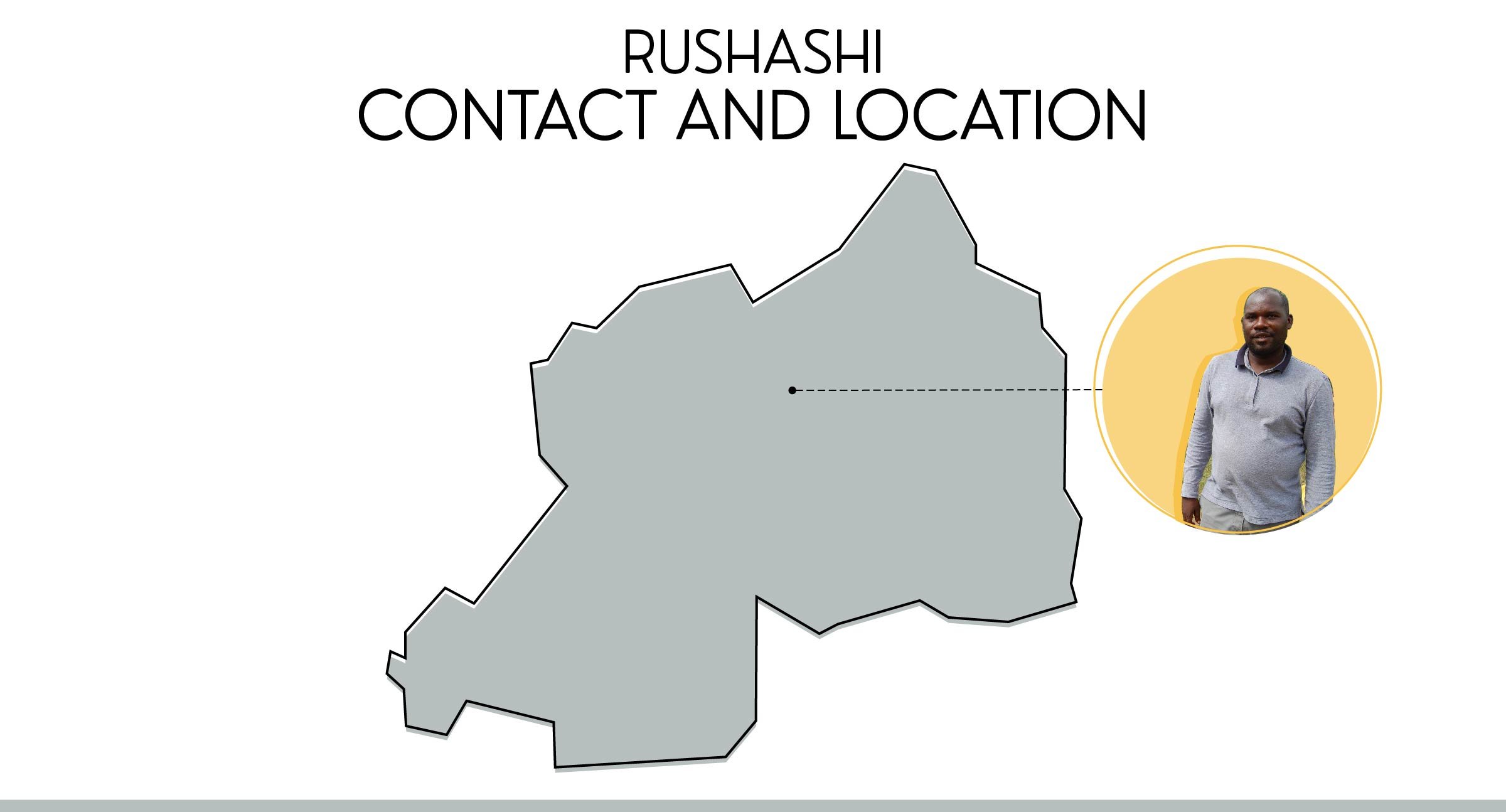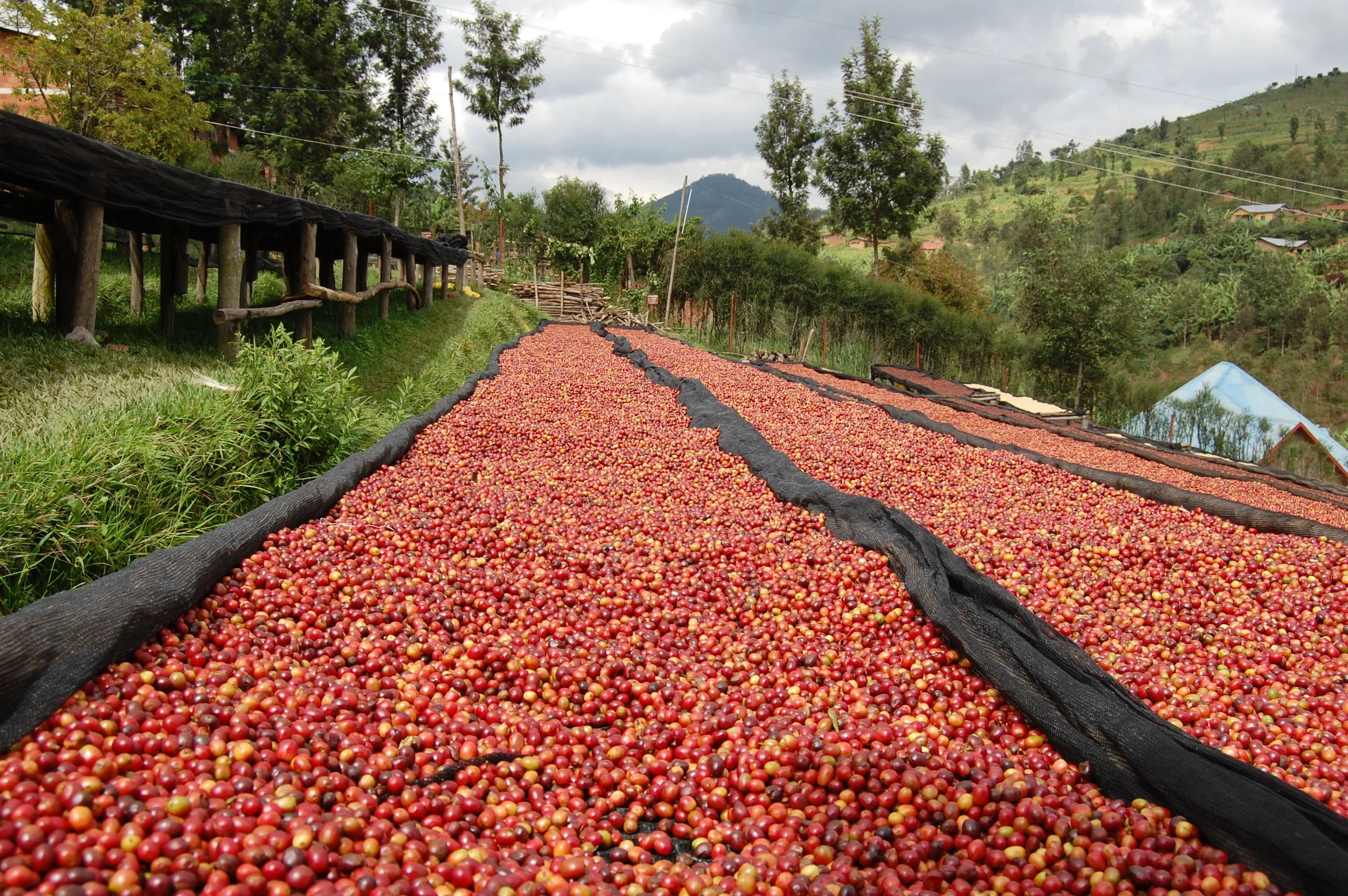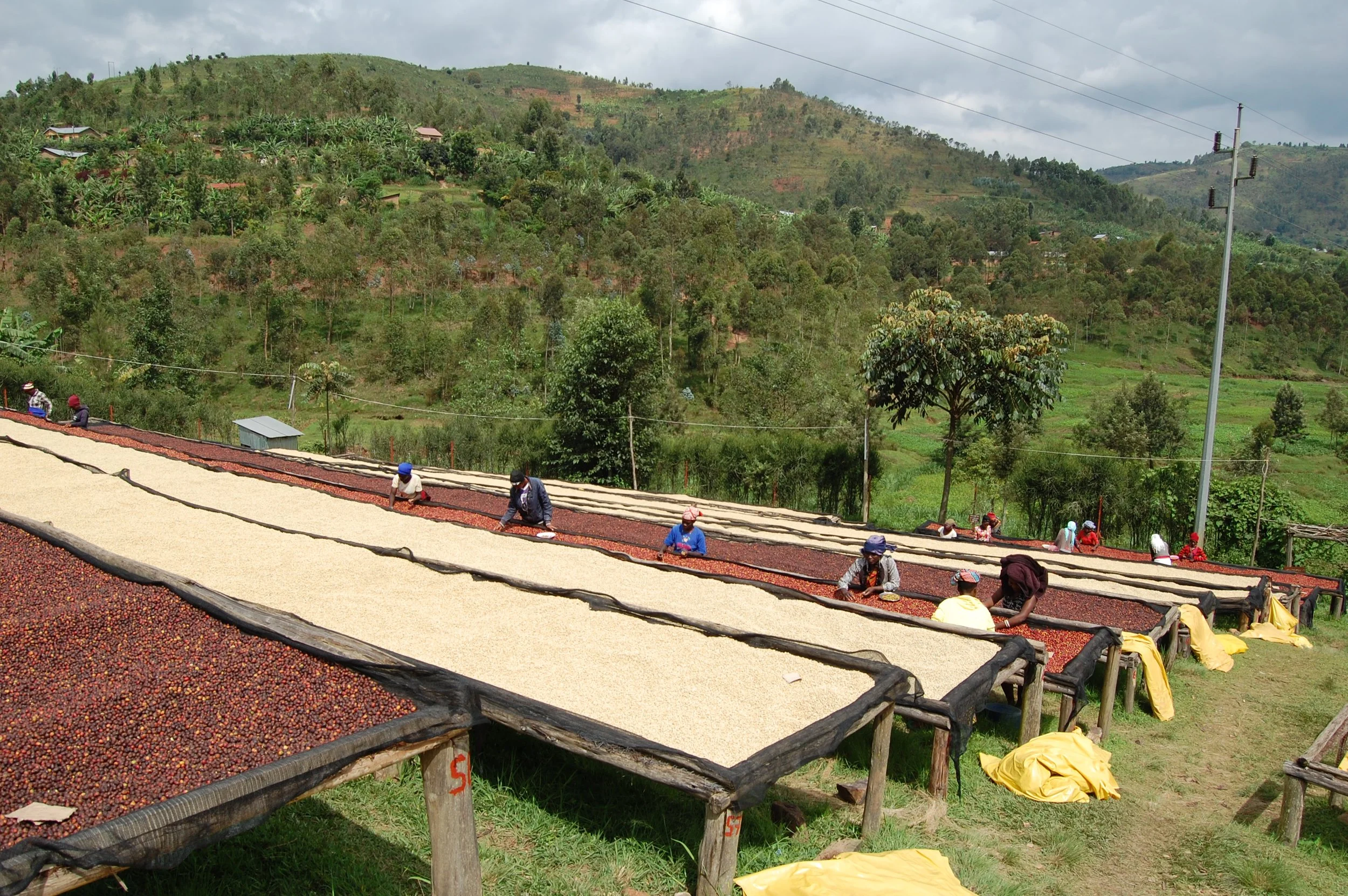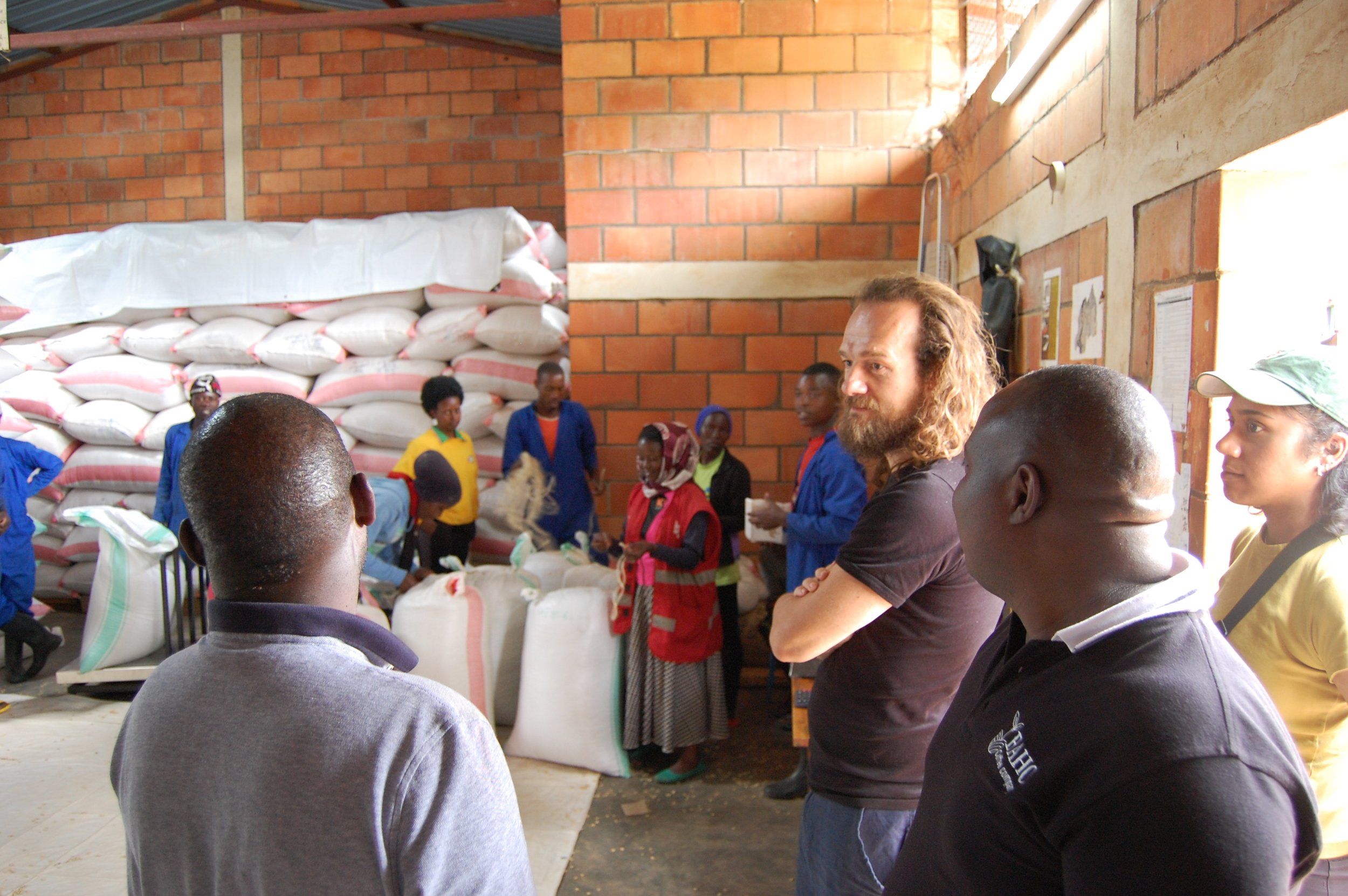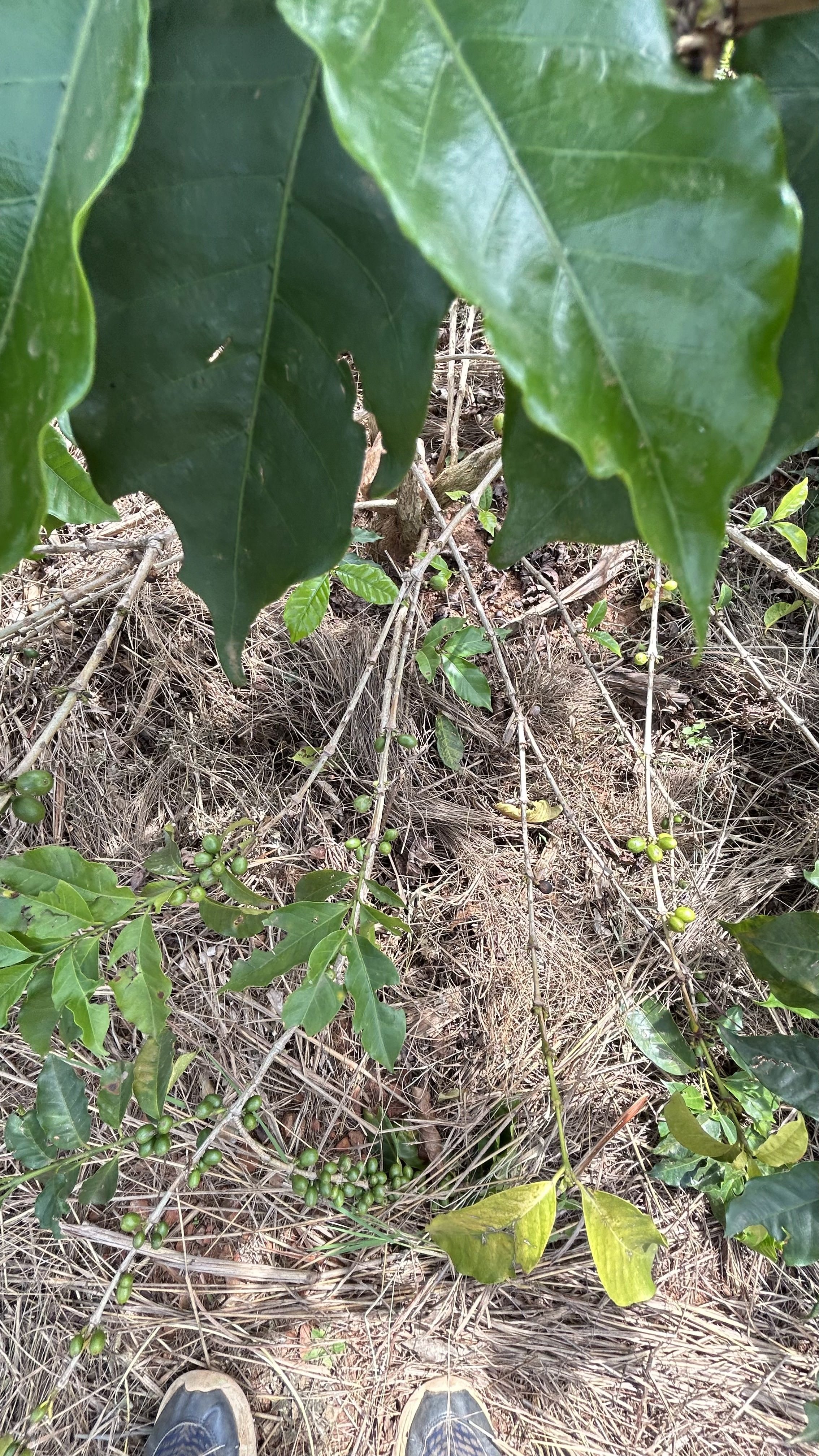Our Rwandan cornerstone
It’s safe to say that Rushashi has been a cornerstone of the success of This Side Up for the first years of our existence. Our fates have been intertwined ever since we started transparently promoting Rushashi in 2013 and other producers (in Rwanda, but soon also the rest of the world) started demanding similar prices. Back then, Abakundakawa had not been around for so long. Before 2012, most farmers in the area traditionally processed coffee at home, but since Antoine took his stance as a manager, many things have changed. After implementing quality and processing techniques, inspiring particularly young men and women to process and grow coffee differently, Rushashi developed water and energy-saving triple fermentation methods, advanced pulp recycling methods, and two women's empowerment organisations. In 2015, the Ishema Youth Coffee Group was born, of which we are proud supporters. Today, Rushashi invests in financial independence from rural banks through carefully developing and managing their credit and savings systems. From 2017 onwards, we have invested in a nursery for shade trees and other plants that organically strengthen the coffee. Today we're running agroforestry trials on a lot pclose to the Rushashi washing station, and the first results are starting to manifest.
Abakundakawa Rushashi started as an association in 1999 with 103 members. Today it’s a solid, well-organised cooperative with 2100+ farmers, of which 900+ are women and 400+ are youth, throughout 17 villages in Gakenke district. We are proud to have continually supported such a beacon of light on so many fronts, and still after all these years, with our beloved friend Antoine in the driver’s seat.
-
Rushashi Coffee Washing Station (CWS) is the largest of two washing stations owned by the Abakundakawa coffee producer cooperative, one of This Side Up’s first partners. It is located in the lush and green Gakenke district, characterised by high spiky hills at high altitudes - making it ideal for high-quality coffee production. It is no coincidence that this region produces some of Rwanda’s most sought after coffees.
Abakundakawa has come a long way since it started as a smallholder farmer association in 1999. It became a recognized cooperative in 2007. Since then, in a relatively short time, Abakundakawa managed to become an advanced operation with over 2000 member farmers, which serves as a prime example of how coffee growers can turn the specialty market into a seller’s market. We were truly amazed by the standards this coop conforms to: it has the facilities to roast and cup samples on-site, employs a full range of organic processing methods (and is on its way to becoming certified organic), provides full transparency in its bookkeeping, and in recent years has received technical and leadership training from the Rwandan government and development agencies - especially from SNV, This Side Up's trusted development partner in Rwanda. In terms of processing, it employs a particularly long fermentation process that has been adopted by several nearby cooperative societies and has likely contributed to the bronze medal they earned at the 2010 Rwanda Cup of Excellence competition.
Despite impressive efforts, for the first years, Abakundakawa faced a high risk of demotivation among its member base: the farmers hardly saw the fruits of their increased efforts; they simply didn’t find enough buyers for their valuable crop. At some point, back in 2014, Antoine Kagenza, the coop's manager, told us that the coop had reached a critical point: their coffee production quality was at its very highest now. That same year, the premium for Abakundakawa was used as a financial buffer against a possibly disappointing harvest season.
In 2015 the Abakundakawa's general member assembly unanimously agreed that the profits of This Side Up's premium (2520000 rwf.) would be used for paying back the cooperative's long-term loan. Borrowing money from rural banks is commonplace all over the world of coffee because of a simple fact: harvesting coffee takes place before selling coffee, while the cost of harvest is by far the largest short-term expenditure for a coffee grower. Anything that can be done to reduce unnecessary revenue being paid as interest to banks (the rate is 14 to 20 percent!) means more money for the cooperative's member farmers.
Later that same year, when we visited the coop in April to make plans the harvest was looking good after a reasonably slow start, we jointly developed Rwanda's first cascara from wet-milled pulp together. In October, when the shipment arrived in Rotterdam, it cupped more sweetly and cleanly than ever. That year's premium was again added to the coop's savings account to lower credit necessities. Our aim is that Abakundakawa can soon have a buffer so large that they will never need credit again.
Abakundakawa is also a good example of how Rwandan rural society is managing to deal with the horrors of the past in a hopeful and inspiring way. During the genocide, many Rwandan women lost their husbands and were forced to take care of not only their own but many orphaned children. These women started to organize themselves in special women empowerment organizations. Their approach towards peace and active listening is steadily bringing stability to their region. The women’s group was born because of their listening approach when, one day, women from opposite sides of the genocide met by chance in the washing station; some were wives of those imprisoned for the killings, and others were the widows of those killed. Tension was evident, but mostly sadness. "We noticed these women were not talking at the same level because they didn't know each other's stories." shares Antoine, "So we began by telling the opposite side’s story to each other." Through this experience, women understood each other and their suffering: they both lost their husbands for reasons beyond their understanding: their grief was the same. They came together as sisters and coffee growers, and two strong women's groups were born: Duhingekawa and Abanyameraka.
This in turn has sparked a discussion among traditional households (with husbands) about ownership of the coffee trees. In Rwandan smallholder families, the coffee trees are owned by men - but if women receive a premium for their produce, it can benefit all financially to pass some of this ownership to the women in the households. This development is slowly but steadily helping Rwandan women’s emancipation and position in society underway.
-
Abakundakawa has been very active in experimenting with cascara since our first trials in 2015. We’ve also created more traceable lots together with Misozi. We found out that the coffee that is collected from one of the washing station's twelve collection points is processed separately in a single day and labeled separately too - only to be blended again after cupping for quality. Since all of these lots meet the grade A requirement anyways, we thought it would be interesting to separate the lots that we thought contained the most desirable flavors for this year. From now on, we will offer only "village lots" from Rushashi, as the collection points correspond to villages where the coffee is produced. For the 2016 season, we bagged and bought all the coffee from the villages of Burimba and Minazi.
We hope that by setting this example, we will encourage coops and exporters all over the country to also create the closest thing possible to microlots in a setup with cherry collection points. Soon perhaps, not just washing stations, but even the tiny villages that supply them can feel the pride of having their coffee promoted worldwide, hopefully adding to the coffee's quality and farmer premiums.
Soon after in 2017, and after receiving feedback on the village lots we pioneered last year, we have been able to conclude that Minazi and Burimba had quite distinct taste features. Whereas Minazi was more fruity and acidic, Burimba exhibits more body. In terms of application, this meant that more roasters preferred Burimba for espresso and milk-based drinks, and Minazi became more popular in its lighter roast form. This year, we have added a third village, Rutabo, to our import list. Early harvest samples showed it was more floral still than even Minazi.
Antoine, the washing station manager, experimented with a natural lot, inspired by teachings from Costa Rica. The early harvest sample is very promising, we hope to see the same quality in the landed stock this year…
After the resounding success of the natural lot (and seeing it win numerous competitions throughout Europe), we asked Antoine to expand the village lot sorting to the naturals this year. He was able to create a Minazi and Rutabo natural lot, which is so popular that in some cases, it has replaced the washed lot in roasters’ and cafés’ assortment. We welcome this change and experimentation as it brings a completely new dimension to what customers can expect in terms of “typically Rwandan” flavors.
In February of 2019, Lennart went to visit Rushashi for the first time in three years. It was touching to see the changes that were implemented in this short time: the new community center, the new nursery, the improvements to the mill, and the vibrant women’s organization Hingakawa were a joy to see, it affirms the cooperative’s strong standing as an example for rural Rwanda, now even more as five years ago when we started working together.
The next step, we all agreed, for the coop is to go one step beyond organic and start to implement agroforestry practices throughout their members’ coffee fields. We are working to establish a consortium with local agronomists and agroforestry organizations - while at the same time starting a pilot this season. The aim is to have an example case to show farmers within five years: a fully reforested plot where all fertilization, soil and water management, and pest control is done automatically - by nature itself.
These groups provided our 2025 import from Rushashi.
Rutabo is one of the 17 villages Rushashi works with, united in their own coffee “group”. Ishema is Abakundakawa’s youth organisation, of which we have been buying all our washed high grade coffees since 2021.
Our Rwandan coops are a good example of farmers taking control of the value chain. Instead of selling their coffee to a mill or exporter, they rent the milling and exporting service and make direct contracts with buyers such as This Side Up. More control, more independence from market prices!
Traceability
You can find all the signed contracts and shipping documents that we made with Rushashi since 2021 below (Google Drive).
2014: first direct sales of Rushashi coffee in Europe through us, creation of savings account for harvest working capital to avoid rural loans.
2015: creation of the country's first cascara trials, subject of a value chain exhibition at the Ethnology Museum in Leiden, the Netherlands.
2016: Rushashi’s trial lot for us was the first ever export of cascara approved in Rwanda, first village lots created and exported: Burimba and Minazi.
2017: new village lot created (Rutabo), first high grade natural lot imported by This Side Up.
2018: after the success of the experimental natural lots, we created two natural village lots: Rutabo and Minazi. Nursery for shade trees and other organic intercrops created with our premium. Rushashi became organic certified this year - a crown on years of hard work to become one of the country’s first fully organic washing stations - in a country still very much defined by its chemical fertilisation and pest control solutions.
2019: starting agroforestry trials on a microlot close to the Rushashi washing station. Decided to import the natural and washed lot of Rutabo village only. The cooperatives’ leadership and field officers begin working in the development of an innovative, integrated, and scalable system for the unique environment of northern Rwanda in the project we jointly developed: Regenerating Farms In Rwanda.
2020: introduction of Ishema Youth Coffee. More than 400 young farmers joined the cooperative and became members. The Regenerative Farms project in Rwanda consolidates. Bought significantly more coffee from Rushashi as the group became part of a government tender.
2021: Our largest order from Abankundakawa yet, 3 containers. Positive reaction to switching all our washed coffee to Ishema, some roasters proudly promote youth empowerment to their customers.
2022: the first results of the Regenerating farms in Rwanda project we collectively developed with our partners from Abakundakawa begin to manifest as trees begin to offer their shade to coffee. Farmers from Rutabo make their best sell ever and become an example to other groups within the cooperative, by openly sharing their knowledge with others.
2023: sadly, for the first time in our cooperation we downscaled our order from Rushashi, as some of our clients overestimated their demand during difficult times. Happily, Abakundakawa’s popularity ensures that they can sell their coffees elsewhere, albeit not for the price that we pay.
Our QC’s Flavour
impressions
Natural lot from Rushashi quite simply became some of the best Rwandan lots we tasted in a while. Classy and familiar, yet fresh - overall feeling of orange blossom, prune and black tea with clean and juicy acidity and smooth mouthfeel make us think, that coffee of this season will find its way to many espresso and filter drinks. The washed lots are classic Rwandans with their orange and raisin notes - a reliable favourite!
Renata Hardewijn, January 2024
Rutabo Natural 2023-2024
RECOMMENDED IKAWA PROFILE
After some tinkering, we finally got the air flow right on the "TSU Washed 1" profile, getting the look of these beans as uniform as possible (Rwandan beans tend to look darker than they taste). This roast makes the washed lots into sweet fruit bombs and allows the tea and floral notes to shine as well. For the natural, we use Sebastiaan Geistdorfer's great and simple natural profile below.
Antoine Kagenza
Rushashi's manager, Antoine Kagenza is always eager to develop relationships, hear from customers or enter into exciting new partnerships. Give him a buzz or let us introduce you.
Email: abakundakawarushashi@yahoo.fr
Phone: +250 783288732
Rushashi, Gakenke District - Northern Province, Rwanda
PHOTO GALLERY
These pictures were taken by us, by Antoine and by visitors over the course of many years.
You may use them freely to promote Rushashi among your customers.








